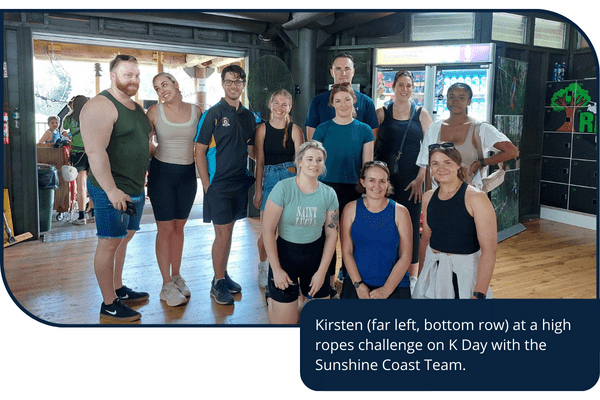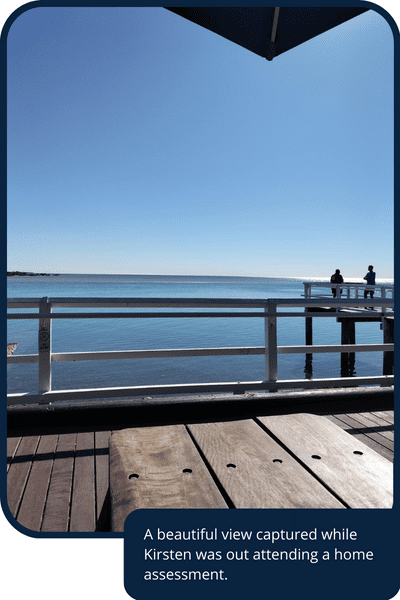A Day in the Life of Senior Consultant & Occupational Therapist Kirsten Barker
What exactly does an Occupational Therapist do as a KINNECT Senior Consultant? To find out, we spoke to Kirsten Barker who been with KINNECT for three years as an Occupational Rehabilitation Consultant on the Sunshine Coast.
Each Day, Kirsten draws on her clinical knowledge and expertise and communication skills to work with clients to ensure their smooth and swift recovery from injury and illness. In this article, Kirsten tells us about her career at KINNECT and what her role looks like.
When did you start with KINNECT and in what role?
I started in November 2020 as a Consultant, and the only OT, on the Sunshine Coast and progressed to Senior Consultant.
What made you apply for this role?
I did a university placement in an occupational rehabilitation company, and I fell in love with it. I always wanted to move into this field.
A previous KINNECTER brought me over from my last company when a role became available.
What‘s your favourite thing about your job at KINNECT?
Firstly, the variety. I could be travelling three hours away to do a home assessment, working in the office, or going to do a worksite visit. Every day is different and not only that, but every time I see someone new it’s in a different setting.
I really like learning about other occupations and understanding them more by seeing the different locations that people work in. One time I did an on-site assessment at a cattle farm!
Secondly, I enjoy doing home assessments which are an OT’s bread and butter. They’re important to give the person independence in the initial stage of their injury so they can independently complete tasks themselves. Then they can start to really reengage with the community and with life, even if they don’t have a work focus yet.
What’s your favourite thing about working for KINNECT?
It’s the culture and the people. Everyone’s willing to help each other out. Everyone is happy to provide an insight into a job or a task and share what they’ve learned about it in the past. It definitely makes the job easier.
What would you say to an OT who is considering workplace rehabilitation as a career path?
The skills that you learn in occupational rehabilitation are transferrable to any other field you go into as an OT. The clinical reasoning, file management, and case review skills you build are fantastic.
Also, you’ll get so much variety, even if the injury is the same, the person and setting is different so what you do for the client will change. It’s not as routine as some in-patient settings, for example you might have to frame the information in a different way so it’s relevant to each person.
I absolutely recommend considering it as OT career.
Kirsten’s Day as a KINNECT Occupational Therapist
AM 
I might have a team meeting, or I’ll hop in the car to a home assessment and on the way, I’ll do some case management. I’ll make phone calls to my existing cases to get updates from them about how they’re working towards their goals. I’ll make mental notes about what I need to provide them.
At the home assessment, I’ll talk to the client to build rapport and then jump into the assessment. I’ll look at their injury history, their treatment and what their experiencing. I find out what deficits that they’re experiencing in their everyday life from the injury. I’ll observe them doing certain tasks that they struggle with, like getting dressed independently, and assess the home environment for example if they can’t bend down to the cupboards in the Kitchen.
I can suggest how they can modify the environment or prescribe equipment to help them be independent while they recover. A lot of the time the changes are only temporary. I often provide the client with simple ways of completing tasks that they mightn’t have thought of!
I’ll then explain the process of what happens after the assessment. Once they get a certain level of capacity back, they transition to return-to-work rehabilitation, or if they aren’t progressing, maybe we’ll look at the medical management side of it and get them engaged with a relevant health professional.
PM
I’ll go back to the office to write up notes and make phone calls to arrange equipment or services like cleaning or mowing that my clients need.
Then I might spend time mentoring placement students, doing in-services for training, or have a file review with my team manager or another consultant. It’s important to do these reviews because progress can plateau after a while so it’s good to get suggestions and fresh eyes on the file. You might think you’ve tried everything, but you may not have considered all the barriers the client is facing.
If you’re interested in a role where no two days are the same, why not join us? For information about current vacancies, visit our Careers Centre.